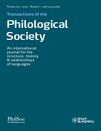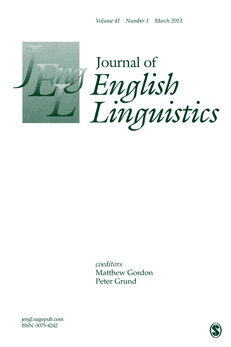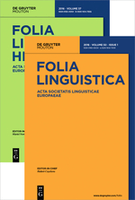
TRANSACTIONS OF THE PHILOLOGICAL SOCIETY
Scope & Guideline
Exploring the Depths of Linguistic Knowledge
Introduction
Aims and Scopes
- Historical Linguistics:
The journal extensively covers the evolution and historical development of languages, examining phonetic, syntactic, and semantic changes over time. - Morphosyntactic Variation:
A significant emphasis is placed on morphosyntactic structures and how they vary across dialects and languages, including studies on agreement, inflection, and grammaticalization. - Language Contact and Change:
The journal investigates the effects of language contact on morphosyntax and semantics, exploring how languages influence one another in contact situations. - Sociolinguistics:
Research often intersects with sociolinguistic themes, examining how social factors and historical contexts shape language use and variation. - Dialectology and Typology:
The journal features studies in dialectology, focusing on regional and historical dialects, as well as typological comparisons across languages.
Trending and Emerging
- Digital Linguistics:
An increasing number of studies are adopting digital methods for analyzing historical and contemporary linguistic data, reflecting a trend towards using computational tools to enhance linguistic research. - Cross-Linguistic Influence and Language Change:
Emerging themes highlight the complexities of language change due to contact, with a focus on how different languages influence each other morphosyntactically and semantically. - Cognitive Linguistics:
There is a growing interest in cognitive approaches to language, exploring how cognitive processes shape linguistic structures and usage, particularly in historical contexts. - Pragmatics and Discourse Analysis:
Recent works are increasingly focusing on pragmatics and discourse analysis, examining how language functions in social contexts and the implications of language use over time. - Interdisciplinary Approaches:
The journal is seeing a rise in interdisciplinary studies that intersect linguistics with fields such as anthropology, sociology, and cognitive science, reflecting a holistic view of language as a social phenomenon.
Declining or Waning
- Traditional Phonetics and Phonology Studies:
There has been a noticeable decrease in purely traditional studies of phonetics and phonology, as the focus shifts towards more integrated approaches that consider phonetic phenomena within broader linguistic contexts. - Static Syntax Analysis:
Research focusing solely on static syntactic structures without considering diachronic or contextual variations has become less frequent, indicating a move towards dynamic and functional analyses of syntax. - Individual Language Studies:
There is a decline in studies that focus exclusively on single languages without comparative or contact perspectives, as researchers increasingly seek to understand languages in relation to one another.
Similar Journals

LINGUA E STILE
Illuminating the Nuances of Language and StyleLINGUA E STILE, published by SOC ED IL MULINO, is a distinguished academic journal based in Italy that delves into the intricate realms of linguistics, literature, and philosophy. With an ISSN of 0024-385X, this journal has been a vital platform for scholarly discourse since its inception, covering a broad spectrum of topics from linguistic theory to literary analysis. Although it currently holds a Q4 category ranking in 2023 across multiple disciplines—specifically in Linguistics and Language, Literature and Literary Theory, and Philosophy—it remains committed to fostering insightful contributions that challenge and expand conventional understanding in these fields. While it does not offer open access, the journal diligently focuses on publishing high-quality research that appeals to academics, professionals, and students alike. With the convergence of multi-disciplinary approaches, LINGUA E STILE is positioned to engage with contemporary debates and developments, enriching the academic landscape from its base in Bologna, Italy, and inviting contributions that exemplify the evolving intersections of language and thought.

Verba-Anuario Galego de Filoloxia
Fostering Innovative Research in Language and PhilologyVerba-Anuario Galego de Filoloxia is a prominent academic journal published by UNIV SANTIAGO COMPOSTELA, dedicated to advancing the field of linguistics and language studies. Hailing from Spain, this journal provides a vital platform for researchers, educators, and students interested in Galician philology and its broader linguistic implications. Although it operates under traditional access models, the journal’s commitment to quality research is reflected in its categorization within Q3 in Linguistics and Language for 2023, showcasing its significant contributions to the field. Encompassing a convergence period from 2017 to 2024, Verba garners attention in both the Arts and Humanities and Social Sciences domains, with its Scopus rankings highlighting its moderate impact within these categories. By nurturing scholarly dialogue and disseminating innovative studies, Verba-Anuario Galego de Filoloxia plays a crucial role in promoting linguistic research, making it an essential resource for professionals and academic institutions striving to explore the complexities of language and philology.

Onomazein
Bridging Cultures Through the Study of LanguageOnomazein is an esteemed academic journal published by the Pontificia Universidad Catolica de Chile, Facultad de Letras, featuring a dedicated focus on the field of Linguistics and Language. With an established presence since 2011, it reaches an international audience and is recognized for its contributions within the Q2 category of Linguistics as per the latest rankings, underscoring its significance in the academic community. The journal holds a commendable position in Scopus, ranking 470th out of 1088 in Arts and Humanities and 549th out of 1167 in Social Sciences, reflecting its relevance and impact in the domain. Although it does not currently offer an open access option, Onomazein remains a critical platform for researchers, professionals, and students seeking to advance their understanding of linguistic phenomena and engage with contemporary debates in language studies. For submissions and more information, please refer to the university’s address at AV Vicuna Mackenna 4860, Santiago, Chile.

JOURNAL OF ENGLISH LINGUISTICS
Fostering Critical Discourse in English LinguisticsJOURNAL OF ENGLISH LINGUISTICS, published by SAGE PUBLICATIONS INC in the United Kingdom, is a premier scholarly journal dedicated to advancing the field of linguistics through a rigorous exploration of the English language. With its ISSN 0075-4242 and E-ISSN 1552-5457, this quarterly journal boasts an impressive impact factor and maintains a notable standing within the academic community, evidenced by its Q1 ranking in Linguistics and Language. Its rich history, covering publications from 1967 to 2024, ensures that it remains an essential resource for researchers, professionals, and students alike, fostering critical discourse and innovative research in English linguistics. While the journal is not open access, it offers a wealth of valuable insights and cutting-edge findings that are vital for anyone interested in understanding the complexities of language structure, usage, and evolution. For those seeking to stay at the forefront of linguistic scholarship, JOURNAL OF ENGLISH LINGUISTICS represents an indispensable cornerstone in the field.

Yuyan Kexue-Linguistic Sciences
Connecting Linguistics with Cognitive and Social DimensionsYuyan Kexue-Linguistic Sciences, published by SCIENCE PRESS, is a pivotal academic journal dedicated to the field of linguistics. With its ISSN of 1671-9484, this journal seeks to explore and illuminate various linguistic phenomena, contributing significantly to the understanding of language in both theoretical and applied contexts. Emphasizing interdisciplinary research, it welcomes contributions that bridge linguistics with areas such as cognitive science, sociology, and communication studies. Although it currently does not offer open access, Yuyan Kexue-Linguistic Sciences aims to provide a platform for researchers, professionals, and students alike to engage with cutting-edge studies and emerging trends in linguistics. Its publication location in Beijing positions it as a vital contributor to the global discourse in the linguistic sciences, catering to both a national and international audience. As the journal continues to grow, it aspires to maintain high academic standards and foster scholarly exchange for years to come.

Language and Linguistics Compass
Exploring the Frontiers of Linguistic KnowledgeLanguage and Linguistics Compass, published by Wiley, stands as a premier journal in the field of linguistics, showcasing innovative and interdisciplinary research. With its ISSN 1749-818X and E-ISSN matching, the journal has built a robust reputation, achieving an impressive Q1 ranking within the linguistics category for 2023, placing it in the top 4% of its field. Its Scopus rank of 48 out of 1167 highlights its influence and significance among linguistics journals, boasting a commendable 95th percentile. This journal serves as a vital resource for researchers, professionals, and students, offering a wide range of accessible articles that illuminate current trends and advances within the domain of language studies. Although it is not Open Access, the journal is committed to quality and diversity in its publications, ensuring scholarly articles from various sub-disciplines of linguistics are represented from 2008 through 2024. Located in the United Kingdom, Language and Linguistics Compass invites contributions from around the globe, reinforcing its status as a leading forum for linguistic discourse.

Annual Review of Linguistics
Elevating Linguistic Scholarship to New HeightsAnnual Review of Linguistics is a premier scholarly journal dedicated to advancing the field of linguistics through comprehensive and insightful reviews of current research and emerging trends. Published by ANNUAL REVIEWS, this journal is recognized for its high impact, evidenced by its Q1 ranking in the Linguistics and Language category and exceptional placements in the Scopus Ranks, positioning it in the top 2% of its field. Since its inception in 2015, the journal has served as a vital resource for researchers, professionals, and students seeking to deepen their understanding of language theories, acquisition, processing, and sociolinguistics. With no Open Access currently available, the Annual Review of Linguistics is esteemed for its rigorous peer-reviewed articles that synthesize a wealth of knowledge, making it an indispensable tool for advancing research and dialogue within the linguistic community.

SPRACHWISSENSCHAFT
Unveiling the Nuances of Communication and CultureSPRNACHWISSENSCHAFT is a prominent academic journal dedicated to the field of linguistics and language studies, published by Universitätsverlag C Winter Heidelberg GmbH. With an ISSN of 0344-8169 and an E-ISSN of 2567-6563, this journal serves as a critical platform for researchers and scholars to explore innovative research developments and theoretical frameworks in linguistics. Although the journal's coverage in databases has been discontinued from 2021, it continues to hold significance in the academic community, reflected in its 2023 Q3 ranking in both the Linguistics and Language category, placing it at the 41st percentile in Arts and Humanities. Exploring various dimensions of language and communication, SPRNACHWISSENSCHAFT aims to contribute to ongoing conversations within the discipline, making it an essential resource for academics interested in the evolving landscape of linguistic research.

FOLIA LINGUISTICA
Bridging Theory and Practice in Linguistic ScholarshipFOLIA LINGUISTICA, published by WALTER DE GRUYTER GMBH, is a premier scholarly journal dedicated to the field of linguistics. Established in 1967, the journal has consistently provided a platform for innovative research and scholarly discourse in language and linguistics, contributing significantly to the academic community's understanding of language structures, usage, and cognitive processes. With its classification in the top quartile (Q1) of linguistics and language in 2023, FOLIA LINGUISTICA holds a respectable rank (#282/1088) within the Arts and Humanities category and an admirable percentile rank of 74th, ensuring its position at the forefront of linguistic scholarship. Researchers and academics from around the globe can access a wealth of knowledge and cutting-edge research findings through this esteemed publication, which is vital for anyone looking to engage with the latest advancements in linguistics. Located in Berlin, Germany, FOLIA LINGUISTICA encompasses all aspects of language research, making it an indispensable resource for researchers, professionals, and students alike seeking to deepen their understanding of language and its complexities.

Turkic Languages
Unlocking the Secrets of Turkic Language StructuresTurkic Languages is an esteemed academic journal published by HARRASSOWITZ VERLAG, dedicated to the exploration and analysis of Turkic languages within the broader fields of linguistics and language studies. With an ISSN of 1431-4983, this journal serves as a vital platform for researchers, professionals, and students interested in the intricate structures, dynamics, and cultural contexts of Turkic languages. Although it currently operates without an Open Access option, the journal's commitment to quality research is evident in its placement within the Q4 category of Linguistics and Language for 2023, alongside its Scopus rankings where it stands in the 30th and 26th percentiles for Language and Linguistics across Arts and Humanities and Social Sciences, respectively. The journal's scope encompasses a variety of linguistic phenomena, striving to foster a deeper understanding of Turkic languages and their significance in the global linguistic landscape. With converged years from 2017 to 2022, Turkic Languages continues to uphold its reputation as a crucial resource for advancing scholarship in this specialized field.